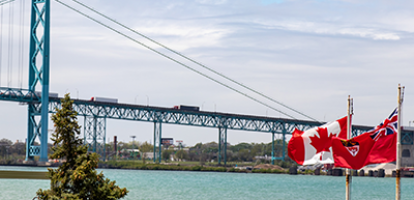From: Rosalie Wyonch, Bill Robson, and Alex Laurin
To: The Hon. Bill Morneau, Federal Minister of Finance
Date: March 6, 2017
Re: Canada Needs Competitive Personal Income Taxes
High personal taxes already disadvantage Canada in the competition for global talent. If the new U.S. administration delivers on its promise of lower personal income taxes, Canada’s attractiveness to high earners, and its appeal as a location for head offices, will slide further. Doubling the income threshold at which the top tax rate applies would reduce Canada’s disadvantage – and, as a bonus, create a revenue windfall for cash strapped provinces.
Canada already taxes personal income at a higher rate than most developed nations. At close to 12 percent of GDP, personal income tax revenues are almost 50 percent higher than the OECD average. Canada’s top personal income tax rate is also among the highest of the OECD (see figure below).
Data source: Chaire de recherche en fiscalité et en finances publiques.
Since 2010, populist pressures have led most provincial governments to raise their tax rates on higher-income earners. Last year, the federal government did the same, hiking the rate on income above $200,000 by four percentage points. Now, the combined federal/provincial top tax rate is close to 50 percent in the three western provinces, and above it in the other seven. In Quebec and New Brunswick it stands at 53 percent; in Ontario and Nova Scotia, at 54 percent.
Because tax rates this high discourage earning additional income, and encourage shifting taxable income to different forms, times and jurisdictions, they not only hurt the economy, but can add little to, or even hurt, government revenue. Empirical evidence shows that top earners are likely to change their behaviour in response to taxes; in fact, once rates are above 50 percent, further increases may yield negligible or conceivably negative incremental revenues for governments as a whole.
Excessively taxing the talent that fuels a more innovative and successful economy is ultimately self-defeating and the prospect of lower personal tax rates in the US heightens the urgency to make Canada’s rates competitive. Accordingly, this year’s C.D. Howe Institute’s Shadow Budget recommends reducing the number of people subject to the highest tax rate by raising the threshold at which it applies from the current $202,800 to $402,800. While there is a net cost to the federal budget of around $363 million annually, the expansion in the tax base and positive economic impacts of taxpayers’ behavioural response more than makes up for it and yield a dividend of around $654 million for provincial governments – a major bonus in an environment where fiscally pressured provinces are pushing Ottawa for more cash. Increasing the threshold for the highest federal tax bracket would result in more government revenue overall, while boosting Canada’s tax competitiveness and making it a more attractive location for top talent and global head offices. In other words, it’s a win-win.
William B.P. Robson, Alexandre Laurin and Rosalie Wyonch are the co-authors of the recently released C.D. Howe Institute report,“Getting Real: A Shadow Federal Budget for 2017”
To send a comment or leave feedback, email us at blog@cdhowe.org.






